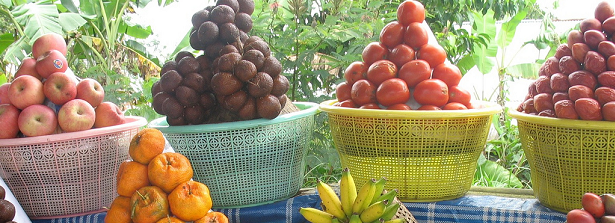Knowledge agenda Fruits & Vegetables Sector and Food & Nutrition Security

Based on input from interested stakeholders and the recently published LEI-WUR report, “How does the Fruit and Vegetable Sector contribute to Food and Nutrition Security?” the Food & Business Knowledge Platform (F&BKP) Office will organize a process to identify the next steps of a joint knowledge agenda on the Fruits & Vegetables Sector. Organizations, companies and institutions with an interest in playing an active role in this process are kindly invited to contact the F&BKP Office.
The knowledge questions identified so far are mentioned below. Please read these as a ‘long list’ from which specific questions may be selected for further joint work.
Overview of the different types of interventions in the Fruits & Vegetables Sector, which can be considered to work towards food and nutrition security. Dutch public and private actors have been involved in various (often official development assistance funded) initiatives in the Fruits & Vegetables Sector. However most initiatives don’t have a clear overview of the different countries’ agendas. Leading issues are:
- Which are the types of interventions and investments in this sector by key Dutch stakeholders?
- Are data available about the results (inputs, outputs, outcomes) of these interventions? (Indicators to be discussed, such as production, income, labor conditions, nutritional status).
- Theory of Change. Interventions that Dutch stakeholders facilitate and/or support are not always based on a clear Theory of Change (ToC), or on a proper analysis of the context or the target group. A positive effect on women’s empowerment, or on the nutritional status of consumers may be assumed, without an explicit strategy in achieving it. Participants of our discussion session on March 3, 2015 agreed that working on a clearer ToC would be an interesting area for further joint work.
- Qualitative assessment of inputs, outputs, outcomes? Impact?
- Dialogue and discussion about whether stakeholders take on the right projects to address food and nutrition security.
Regarding gender dynamics, the explorative study was expected to generate knowledge about the positive impact of the Fruits and Vegetables sector on women’s empowerment and on the position of women in the value chain. So far, the research findings have delivered information about the number of jobs created for women in different parts of the horticultural value chain. The findings do not conclude whether the number of jobs has contributed to the achievement of broader gender equality objectives.
Fruits and vegetables production aspects, such as disease resistance.
Business models and local context are valuable to discuss, including the question of which business models make fruits and vegetables production more attractive to small farmers? What is the business environment? From another angle: if international governments or investors invest in fruits and vegetables, what is the “development dividend”?
Fruits and vegetables value chain related aspects, such as shelf life of products and post-harvest loss.
Consumption patterns and dietary habits, particularly of urban poor or other vulnerable groups. Raising consumer awareness. Do interventions in the Fruits & Vegetables Sector lead to dietary changes? Is there a link with bio-fortification? Many existing programs tend to focus on the production of fruits and vegetables but not on the consumption side. In many LMICs, fruit and vegetable consumption is increasing, although it is still lower than recommended amounts. Cultural factors play a key role in this context, e.g. Francophone African consumers eat more vegetables than Anglophone African consumers.
It is valuable to compare the Fruit & Vegetables Sector with other productive sectors with high levels of smallholder involvement, such as poultry farming, dairy farming and agro-commodity production (e.g. cocoa and coffee) for its FNS impact potential.
The income and employment effects of the recent changes in the high value commercial Fruits & Vegetable Sector, particularly also related to the shift from rural to urban-based employment.
The most effective strategies for including increasing numbers of smallholder producers in supplying the growing high-value domestic fruits and vegetable markets in developing economies, with due attention also to the opportunities for female growers and farm workers and youth.
Evaluation of the effectiveness and viability of existing strategies aimed at creating added value for smallholder producers in supplying domestic BoP (‘Bottom of Pyramid’) fruits and vegetable markets, including individuals at risk of malnutrition.
Sources:
- Joosten, F., Y. Dijkxhoorn, Y. Sertse and R. Ruben, 2015. How do Fruits and Vegetables Contribute to Food and Nutrition Security? Wageningen, LEI Wageningen UR.
- Food & Business Knowledge Platform. Expert meeting 3 March 2015 discussing preliminary study outcomes.





